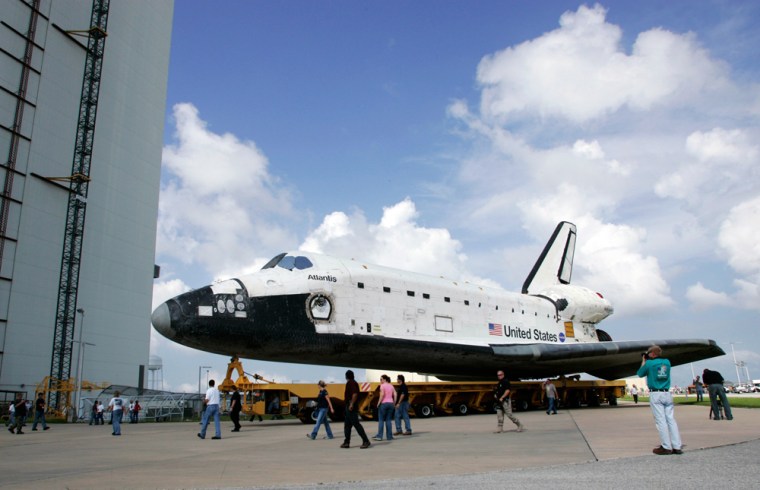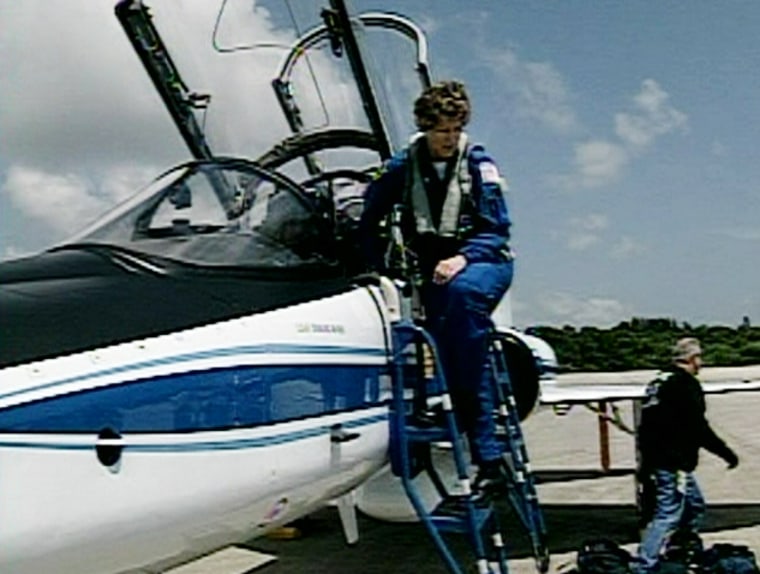NASA engineers believe they have isolated the fuel-gauge malfunction that stopped last week's countdown toward the shuttle Discovery's launch, and with Tropical Storm Franklin headed north, the launch team is set to begin a new countdown Saturday for a Tuesday launch.
Engineers worked on the electrical grounding problem that they now feel is the culprit, even as Discovery's crew flew back to Florida from Houston, where they went through a brief round of additional training. After the crew landed their T-38 training jets on the shuttle landing strip at NASA's Kennedy Space Center, Discovery commander Eileen Collins praised the launch team for its work on the fuel-gauge glitch.
"We are very proud of the work that the engineers and the managers and the technicians have done over the past week and a half, trying to find out what's going on with this very elusive problem," she told reporters.
Collins said that although she hoped the shuttle would be launched on Tuesday, the precise date of liftoff wasn't the most important matter. "What's important to us is that we get through this process and that we do it right," she said.
On Thursday, forecasters were concerned that the birth of Franklin over the Bahamas might threaten a second launch attempt. But on Friday morning they said that the storm was not expected to be a factor.
If Franklin stays offshore as predicted, Discovery's second countdown will begin at noon Saturday, aiming for a launch at 10:39 a.m. ET Tuesday. Discovery's mission to the international space station would represent NASA's first shuttle flight since the Columbia accident more than two years ago.
Fuel-gauge glitch
The first launch attempt, on July 13, was called off less than three hours before liftoff when one of the four low-level sensors in Discovery's liquid-hydrogen fuel tank gave bad readings during a pre-launch test. The sensor system is supposed to provide an indication analogous to the "E" reading on a car's gas gauge if the hydrogen is close to running out. That would signal the shuttle's computers to start shutting down the main engines.
If the sensor system failed, the engines might shut down too soon — or keep running on empty, damaging the propulsion system.
For months, the intermittent fuel-gauge problem had been plaguing NASA officials, who called it an "unexplained anomaly." But after last week's scrub, engineers conducted an intensive troubleshooting sweep and found a grounding problem in the sensor system's circuitry. They concluded that the problem was allowing electromagnetic interference to trigger false readings.
Mission managers say they will be watching the fuel-gauge system closely as they refill Discovery's external fuel tank on Tuesday. If the problem reappears, they could either try a quick fix, call off the launch — or allow the countdown to proceed despite a glitch. Current rules for launch require that all four low-level sensors work correctly, but the system is designed to perform even if two of the sensors go out.
The shuttle's mission
Discovery's 12-day mission is aimed at resupplying the space station, as well as testing the safety procedures developed since the shuttle Columbia broke up during re-entry on Feb. 1, 2003. That tragedy killed all seven astronauts aboard and grounded the rest of the shuttle fleet. Since then, the orbiter and its fuel tank have been redesigned to minimize the risk of debris hitting the shuttle's protective skin — which investigators believe was the cause of Columbia's loss.
More than 100 cameras will be trained on Discovery at launch, looking for any sign of damage, and during flight, astronauts will test newly developed tools for inspecting and repairing the shuttle.

The timing of the launch depends on the orbital position of the space station as well as the lighting conditions for liftoff and ascent.
In the past, NASA has said Discovery's current launch window would close July 31. However, managers are considering an extension of the current window a few days into August. Extending the launch window would mean giving up some of the imagery showing Discovery's external fuel tank as it comes off the orbiter.
Meanwhile, the shuttle Atlantis was moved on Friday from its "garage" in the Orbital Processing Facility at Kennedy Space Center to the nearby 52-story-high Vehicle Assembly Building. There, the orbiter will be mated with its own fuel tank and solid rocket boosters, in preparation for launch in September.
If Discovery is unable to lift off this month, it would take over Atlantis' launch slot in September, and the Atlantis mission to the space station would be rescheduled for no earlier than November.
This report includes information from NBC News' Jay Barbree at Kennedy Space Center.
